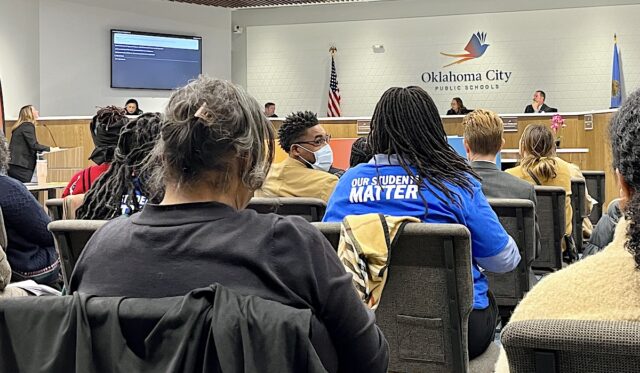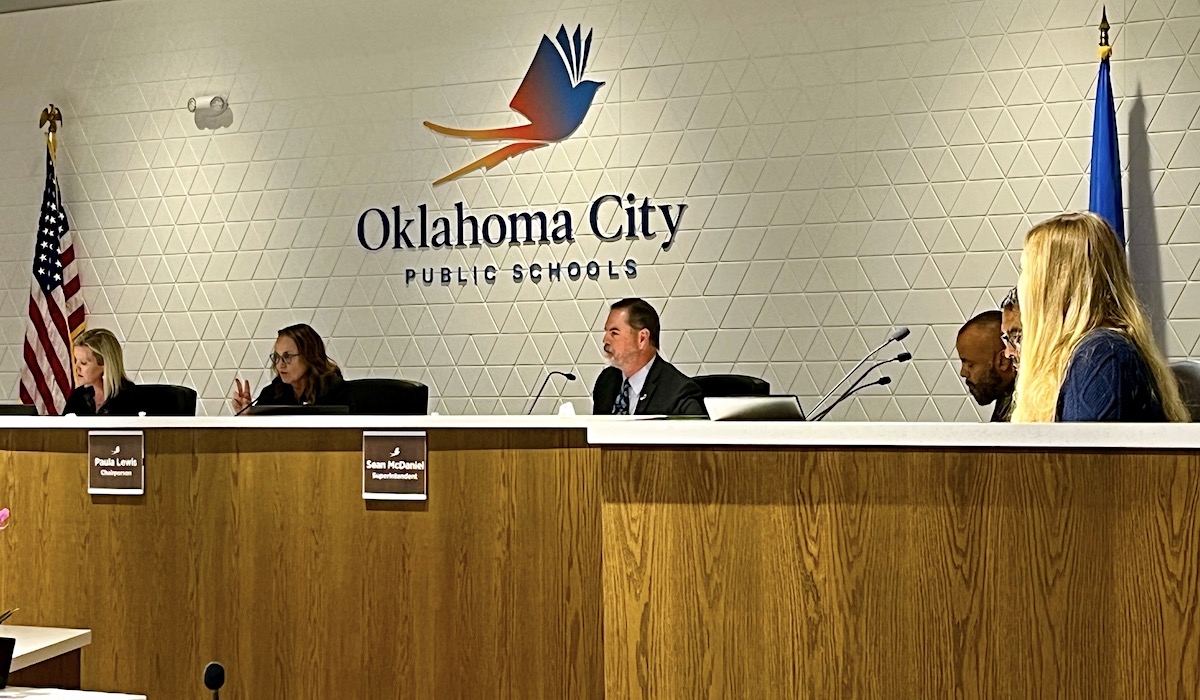
During a special meeting that featured re-votes and confusion over how the district handles applications for charter schools, the Oklahoma City Public Schools Board of Education voted to authorize Oklahoma Montessori Initiative in northwest Oklahoma City but preliminarily rejected three other applications in northeast OKC.
While the approved school proposal will now enter contract negotiations with the hope of opening in fall 2025, the three other efforts will have 30 days to regroup, address feedback from the district’s evaluation committee and resubmit for final consideration. The committee and OKCPS Superintendent Sean McDaniel had recommended denying all four applications Monday night, but at least two board members voted against the denial recommendation each time.
“I don’t think it’s necessarily a negative if these are denied tonight, because you’ve still got 30 days,” District 4 board member Mark Mann said during the meeting.
Combined, the four applications mark the first newly proposed charter schools within OKCPS boundaries since the board approved Western Gateway Elementary School on its second attempt in 2019 and twice rejected what the State Board of Education ultimately approved as Sovereign Community School.
After Monday’s meeting, Mann recalled past charter school proposals, which often receive initial denials and go through revisions before final consideration.
“For Western Gateway, there were some things that the district pointed out — grade bands, feeder patterns and some other things. They went back and got those corrected, and it sailed through,” Mann said. “Go to the other one that I’ve been a part of, which was Sovereign (Community School), that never addressed the budget and facility issues and those things. We denied it twice, and we see what has happened with Sovereign. It has just been a saga ever since.”
Mann said the three schools initially denied Monday night — P3 Montessori Charter School, RISE STEAM Academy and Willard C. Pitts Academy — will receive the evaluation committee’s feedback Tuesday.
“I suspect that if they go back and take that rubric that they’re being provided and they address those deficiencies, it could be a different recommendation in 30 days,” Mann said. “From an authorizer perspective, I want to see a good governance plan. As I said tonight, operate like a public school and not a nonprofit, because you are a public school. Number two, I want to see the finance piece. Do they understand the Oklahoma Cost Accounting System, because that has tripped up a lot of charters. Do they have a good budget in place that’s realistic? And then number three is that facility piece. Do they have a facility? And again, we don’t expect them to have a lease, but do they have a location or two where you have a property owner who says they want to rent it to them.
“I think maybe some of the applicants tonight have those pieces, like the location piece. But they just weren’t included in the application, and I believe they’ll have a chance now to tweak that and get that in.”
‘One of these is not like the other’

Charter schools are public schools that operate with their own boards of directors and greater flexibility on certain requirements. They can also be operated by private management organizations. However, a string of Oklahoma charter schools have failed over the years, including Seeworth Academy, Harper Academy, Marcus Garvey Leadership School, Alexis Rainbow, Lighthouse and Langston Hughes Academy. In addition, the state’s largest charter school — Epic — has seen an overhaul in leadership owing to an alleged racketeering conspiracy that drew criminal charges against its founders.
Meanwhile, as a district, OKCPS has scored poorly in terms of student achievement for decades, leaving many parents seeking other options for their children and compelling some community leaders in northeast Oklahoma City to pursue opening new charter schools in the historically Black area of town. Nationally, communities of color continue to favor additional school options for their children, including charter schools. Originally authorized by OKCPS, Santa Fe South has grown its charter network significantly over the past decade in south Oklahoma City.
Community members who attended Monday night’s meeting were predominantly Black, and the board’s decision to approve the only school not proposed for northeast OKC caught the attention of some in the audience.
“One of these things is not like the other. I don’t know. You’re the journalist, you figure it out,” said Sandino Thompson, a community developer supporting the Willard C. Pitts proposal, which seeks to establish “rigorous academic excellence” for fifth through eighth graders in northeast Oklahoma City.
Asked how community members could look at Monday night’s votes and not say the school in northwest Oklahoma City was approved while the three proposals for the historically Black side of town were not, OKCPS Board Chairwoman Paula Lewis said, “That’s a great question.”
“Some of it’s based on law, and we know people can come back with more application information,” Lewis said. “This board is consistent, and we have remained consistent, that every child — and that’s our equity policy — deserves access to a world-class education. And while this might have been a split or not a unanimous vote, it definitely shows the board recognizes that there’s a lack of options — or opportunity is maybe a better word for it — on the northeast side of town.”
Review the OKCPS
charter applications
Adrian Anderson, who represents District 5 in northeast OKC, voted against all four charter applications, including the three in his district. Asked his thoughts about the three pending proposals in the area he represents, Anderson declined to comment, but he did say he is open to discussing the schools with his constituents.
“I’m here to listen, learn and make an informed decision based on that,” Anderson said.
Carma Barlow, who watched her proposed RISE STEAM Academy receive initial rejection 5-3, noted the political dynamics of having three charter applications pending at once in northeast OKC.
“I think with three of us being on the same side of town, what I would think is the board just wants to have more time to consider since there would be competition among so many more schools,” Barlow said.
Latasha Timberlake, who leads the potential new Willard C. Pitts Academy, declined to comment on the board’s initial denial of her application. However, she said she is interested in hearing the board’s feedback.
“I am glad that people are interested in bringing more tools and resources for kids in northeast Oklahoma City,” Timberlake said.
Rosalyn Robinson, who has proposed P3 Montessori School to serve about 90 young children in northeast OKC, said she couldn’t speculate on why the board voted how it did, but she said her group will reapply before the 30-day deadline.
Robinson prepared remarks for Monday night’s meeting in case she had the chance to speak publicly, but no board member asked questions of the school applicants or provided an opportunity for them to speak.
“Our board is comprised of community members that believe in the Montessori method — which encourages children’s natural ability to discover and create — and we are committed to bringing this method to children in the northeast community,” Robinson wrote in her notes. “The research shows that (for) children who have just two years of Montessori exposure, it dramatically improves their academic outcomes over the span of their education.”
Approved school heads to contract negotiation
Meanwhile, leaders of the approved Oklahoma Montessori Initiative said they plan to take the next year to plan and finalize arrangements before opening for the fall 2025 semester.
“I was sitting in the chair kind of tearing up because again, (I was) not expecting the vote that we got tonight,” OMI leader Rufus Howard said after the meeting. “(This will) bring new opportunities to Oklahoma City Public Schools students — students who deserve it. I think it’s a great thing, and so we are ready to embark on this journey.”
OMI faced three separate votes during Monday night’s meeting. Lewis made the first motion to follow the committee’s recommendation and deny the application. That motion failed, with four board members voting for and four voting against. The board members who initially voted to deny the OMI application were:
- Lori Bowman,
- Cary Pirrong,
- Mark Mann, and
- Adrian Anderson.
The board members who initially voted against denying the application were:
- Paula Lewis,
- Carole Thompson,
- Juan Lecona,
- Meg McElhaney
The second OMI vote came after the board had voted to deny the other three schools. Bowman, who represents District 2 from which OMI would draw students, switched her vote on the second denial motion, causing it to fail 3-5. Then, a motion was made to approve the OMI application, and Mann joined Bowman in switching for a 6-2 tally.
Once opened, OMI will likely be Oklahoma City’s first public Montessori school. Montessori schools provide a different learning environment for students, which typically features kids of different ages in classes with the same teacher for three years at a time. Students in Montessori classrooms are encouraged to explore things that interest them and often learn through hands-on instruction.
“Montessori is really rooted in child development and where they are developmentally, socially, physically, academically. And so with this method, we’re allowed to meet children where they are in all those areas, and really hone in on what their skill set is — what they need and also grow what they have, what their strengths are,” said Diane Beckham, another supporter of the OMI charter school. “It’s really highly structured, but it’s a different structure. So there’s a very strict scope and sequence, but the rate you go through that scope and sequence is up to the ability and the needs of the child.”
Lewis said she is excited by OMI’s approval.
“While I’m very proud of our existing options already found within OKCPS, I am excited that Oklahoma Montessori Initiative was approved as it will provide the only public Montessori program available to families within our boundaries,” Lewis said.
Follow @NonDocMedia on:
McDaniel weighs ‘opportunity’ with ‘sacrifice’
After the meeting, OKCPS Superintendent Sean McDaniel said he thought board members and the three applicants who were denied Monday probably wanted more communication with each other as they work through the application process.
“Maybe in the next 30 days, prior to resubmission, we might see a special meeting where they come in to tighten things up and then present prior to that resubmission,” McDaniel said.
McDaniel also addressed concerns that public school districts might have an interest in denying most charter school applications because of the “competition” they provide to regular public schools by decreasing their student population and, subsequently, the per-pupil funding provided by the state.
“I am and have always been a proponent of educational choice. As the leader of OKCPS, I can show you dozens of choices within our schools. So choice doesn’t always mean a private school, a charter school, a homeschool — it includes those things, and if those are things that parents and caregivers opt into, I love that because I’m a believer that family matters,” McDaniel said. “There are financial implications anytime a charter school pops up. I mean, that’s just a fact — that’s not for or against. If I fill a charter school with kids who, prior to, attended traditional public schools, that money then moves with that child to the new school.”
McDaniel said that despite the financial implications of more charter schools being proposed for his district, he supports anything that will help kids in Oklahoma City.
“I am supportive of any opportunity — charter, traditional public or otherwise — that offers kids something that they’re not otherwise getting. I support that. And if these charter schools can show us that, I’m all in,” McDaniel said. “But there will be a sacrifice to that in terms of dollars and cents, and our kids maybe ultimately leaving us to move into another setting — that’s the trade off. But if it matters to that kid, and that kid can be successful where he or she otherwise could not be, I’m all in.”
McDaniel said he thought the charter school applications that were denied Monday evening could eventually offer something new to their communities, but he said applicants most have a strong proposal for adding to the educational environment in a manner that will allow a charter school to succeed.
“Right now, I’m not convinced because of what I saw on their applications,” McDaniel said. “They do have the wherewithal to come back with an application where our evaluators, our staff, our board of education look at it and say, ‘Man, this does give us something different.’ And if that’s the case, then we need to affirm that. We need to acknowledge it. We need to bring them in and say, ‘Let’s be good partners.'”
Bowman echoed McDaniels’ sentiment after Monday’s meeting.
“The other thing I’m looking for is innovation,” she said. “I think we’ve got to look at what is innovative about these applications and what [would be] offered through these charters that isn’t currently being offered in OKCPS, and we can use these as a laboratory for learning about what works, what families want and what benefits Oklahoma City kids.”





















